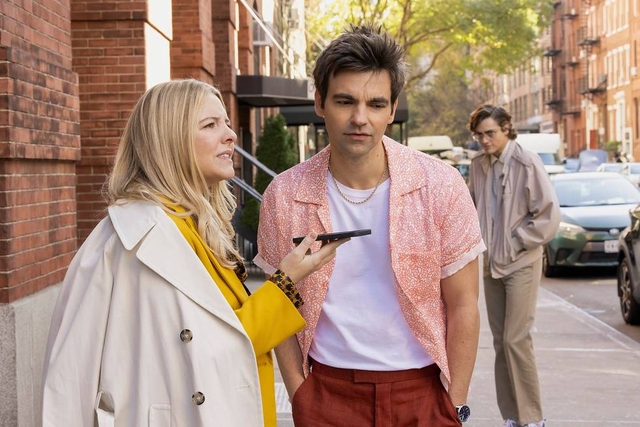
In the Season 3 premiere of Max cult comedy The Other Two, Cary Dubek finally gets his marquee moment. Following a COVID-related delay of record-breaking proportions, the long-suffering actor sees his first major movie released. Indie drama Night Nurse should be a breakthrough for Cary (Drew Tarver). But then the premiere ends right in the middle of the director’s opening remarks about how great it is to be back in the theater again; the cinema is, right this minute, becoming a Starbucks. So begins Cary’s demented quest to watch the straight-to-streaming Night Nurse with another human being—anyone will do. It isn’t easy. “I don’t know if I have a whole movie in me tonight,” says one stranger he’s surveilling through her window in hopes she’ll take a chance on it. “Maybe we can just watch 30 episodes of Friends.”
An introduction to a third and final season focused on Cary’s Hollywood odyssey, the episode doubles as a hilarious summary of the past few years in film and TV. The pandemic shut down thousands of movie theaters. Streaming services proliferated. (Cary spends hours trying to remember his Hulu password, only to discover Night Nurse is on a different platform.) Films that might have slowly built buzz in limited theatrical release instead languished on platforms stuffed with familiar, comfort-food programming. The Other Two has always been an unusual combination of sharp showbiz satire and tender family sitcom. But in its last season, which ended this week, the show topped itself by nailing the chaotic energy of the streaming era.
Read more: The Streaming Wars Have Entered Their Chaos Era
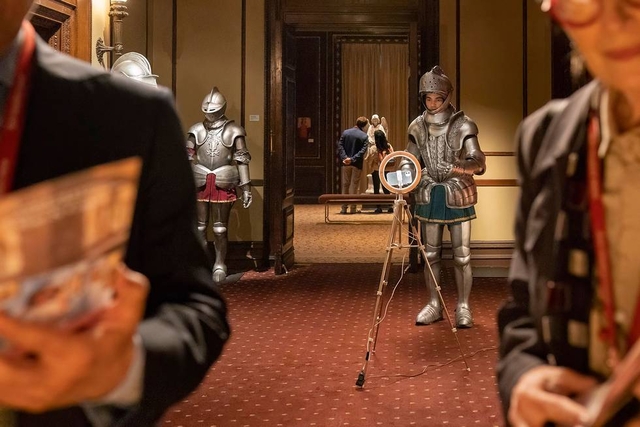
The Middle American Dubek clan has come a long way in three seasons. Introduced in the pilot by way of a perfectly counterfeited E! News segment and a mock Today show sit-down with the real Kathie Lee Gifford and Hoda Kotb, 13-year-old Chase “ChaseDreams” Dubek (Case Walker) was the first family member to become a star, with his viral tween-pop earworm “Marry U at Recess.” As his wide-eyed stage mom Pat (Molly Shannon, then sporting vintage Kate Gosselin hair) shuttled him around New York, Chase’s adult siblings struggled to, er, chase their own dreams. For Cary, a callback for a role in a commercial as a guy who catches a whiff of a fart at a party counted as a big break. Brooke (Heléne Yorke) had been a professional dancer as a teen but was now relegated to showing luxury apartments—and secretly sleeping in them, too, following a breakup with her hot but corny longtime boyfriend, Lance (Josh Segarra).
The siblings spend the show’s first season watching Chase packaged and sold to the middle-school girls of America as the next Justin Bieber, simultaneously envious of his effortless success and worried about what fame might do to their sweet, normal kid brother. An effusive but incompetent manager, Streeter (Ken Marino), and a shrewd but ruthless record executive, Shuli (Wanda Sykes), become the Dubeks’ deeply flawed guides through the predatory pop-music machine, from awkward rites of passage (Chase has a 14th birthday party at a trendy club) to publicity stunts (Chase fake-dates a famous girl singer). The punchline, delivered in the season finale, is that Chase can’t actually sing; he bombs an MTV VMAs performance. As Chase’s career stalls, Pat gets her own talk show, kicking off a second season that pivots from the music business to a daytime-TV landscape whose currency is manufactured relatability.
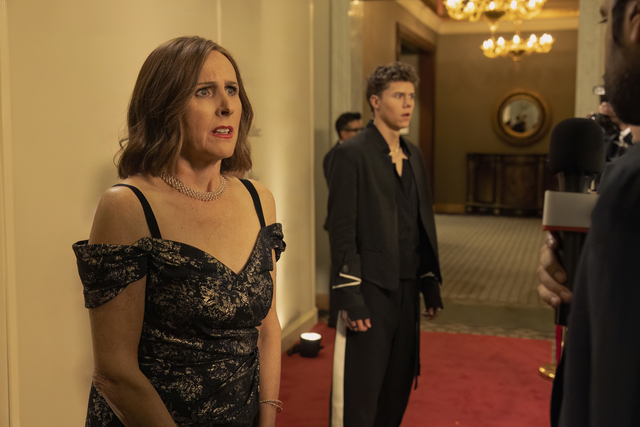
Each season draws out the contradictions, hypocrisies, and absurdities of its respective corner of the entertainment industry. Chase has to be sexy in a chaste, innocent way. Pat gets so famous for her approachable warmth, she’s no longer an ordinary mom—she’s a workaholic on the verge of a nervous breakdown. Brooke and Cary remain the marginalized other two. Shallow, self-involved, and pushy, she blossoms into a manager. Cary, who is gay, parlays his proximity to Pat and Chase into D-list fame, hosting queer-themed online news programs and chasing roles that never seem to work out as envisioned. His quaint ambition to be not just a star, but also a real, accomplished actor lends a touch of tragedy to a comic character.
By the time Night Nurse debuts, Cary is obsessed with securing his spot in Hollywood. Sadly for him, new titles pop up daily on a dozen different streaming services; his well-reviewed performance drops off the cultural radar immediately. When posting obsessively about the movie on social media fails to generate attention, he outsources his PR. The results? A wild goose chase for coverage on a blog called TheBrooklynBurrito.com (whose offices actually house a mental-health facility for publicity addicts) and a ransomware attack that costs Pat, who is now basically Oprah, $100,000. The Other Two thrives on hyperbole. But when it comes to the lifespan of a mid-tier streaming movie, the show is barely exaggerating.
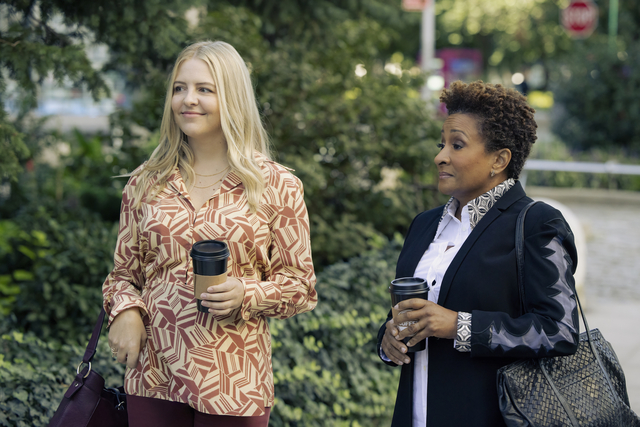
When Cary does finally get a solid foothold in the industry, eight episodes into the season, it’s only because he happens to win the algorithmic lottery. Windweaver, an apparent Lord of the Rings clone that he spent the better part of a year shooting in Croatia, becomes a hit. And then Cary’s extremely minor character—an elf who utters nary a line of dialogue in the first season—is revealed to be the titular windweaver. Sure, why not? In a marketplace where The Witcher ranks among Netflix’s most-watched series of all time but The Chair gets unceremoniously canceled after just one season, anything can happen.
Not that the randomness of the streaming roller-coaster preempts other forms of showbiz insanity in Season 3. When Chase turns 18,a photo shoot featuring the first images of his naked, er, armpit sells for $8 million to Rolling Stone, and Brooke has to drive the files across the country in an armored truck with an operative from GQ on her tail. Pat is now so famous that she can’t go out in public; her family has to construct a fake Applebee’s in a studio and hire extras to fill the other tables in order to give her the regular, suburban night out she craves.
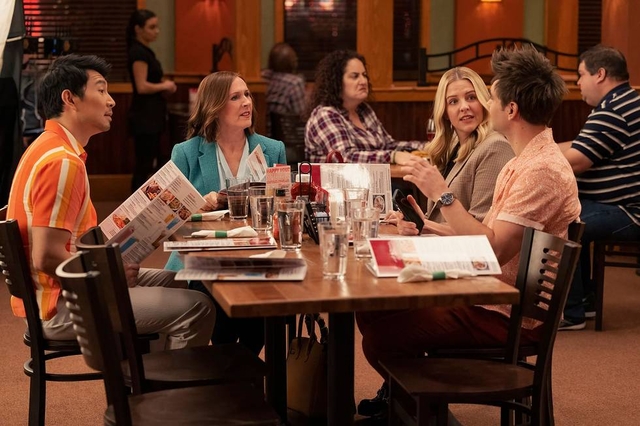
In what might be the show’s single best episode, Disney casts Cary to voice the “important gay role” of a blob named Globby in something called Haunted Buddies 4. Globby becomes a cause célèbre. Magazine covers proclaim: “He’s here. He’s queer. He’s Globby.” Controversy ensues, without anyone having seen the movie. Then it premieres, and the goo’s sexuality is so ambiguous that even Westboro Baptist Church protesters fail to see anything worth their outrage. Once again, creators Chris Kelly and Sarah Schneider are ripping straight from real life. Disney’s Big Hero 6: The Series actually has a queer-coded goo character named Globby. And, once again, The Other Two exposes bad faith on all sides of our pop-cultural conversation.
There have probably never been as many good TV series about show business as there are right now. Call My Agent! and Flack take us behind the scenes of celebrity, through the eyes of the people who clean up their famous clients’ messes. Hacks bridges the gap between two very different generations of unlikable women in comedy. Dave follows a painfully neurotic white rapper on the come up. Irma Vep finds a troubled filmmaker chasing cinematic ghosts through a cynical industry, while I Hate Suzie traces a former child star’s desperate efforts to recover from a career-imploding scandal. (Together these Max series should’ve obviated the need for The Idol, but I digress.) Party Down is back with its cater-waiter vision of Hollywood purgatory. Barry’s second season even included a streaming story line in the vein of Night Nurse.
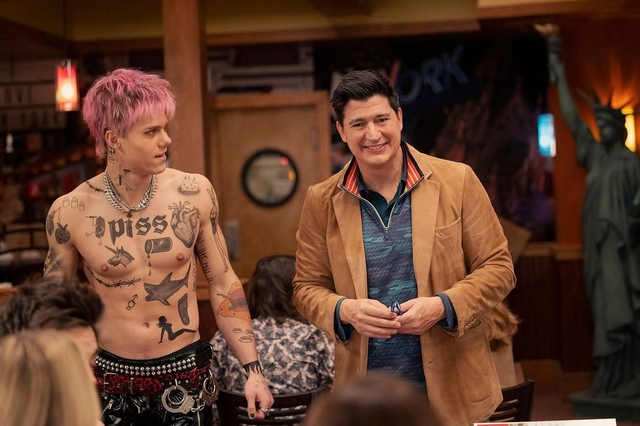
Yet none of them nails the sensation of living through streaming’s chaos quite like The Other Two does. Lingering in the background of every episode is a voracious maw of entertainment content—not just movies or TV shows or pop songs, but also news and advertising and the constant churn of discourse that surrounds it all. Sure, the streaming wars are their own tragicomedy; a harried sound woman stalks Cary in one episode, forcing him to record ADR for a title that’s being rushed through post-production. But they’re also just the latest curveball thrown by an industry where a few obscenely powerful people pull the strings and make everybody else dance. The show’s punchy delirium, punctured by the exhaustion to which Cary, Brooke, Pat, and Chase all periodically succumb, is Hollywood 2023 boiled down to a vibe.
Which makes The Other Two’s own trajectory at once predictable and depressing. It premiered on Comedy Central in 2019, as part of a slate of scripted originals that now barely exists on the cable channel. Then it moved to WarnerMedia’s new HBO Max platform, which came out the other end of the Warner-Discovery merger as the ostensibly less elitist Max—a transition that took place midway through the show’s third season. With Warner Bros. Discovery CEO David Zaslav playing to TV’s lowest common denominator with such projects as the downsizing of Turner Classic Movies and the disappearance from Max of niche gems like Made for Love and Minx, it wasn’t hard to predict the fate of this smart, offbeat, critically acclaimed comedy.
But it still hurt to learn, on the eve of Thursday’s finale, that it had been canceled. Worse still, THR reported that the show’s demise had come amid (though not because of) HR complaints “that Kelly verbally abused writers and overworked crew and claims that Schneider enabled his behavior.” According to one anonymous source, “writers tell stories about The Other Two writers’ rooms like other people tell ghost stories.” It sounds like fodder for a fourth season that, despite Kelly and Schneider’s insistence that they intended to end the show now, the Season 3 finale set up for an arc following Brooke as she becomes Hollywood’s most sought-after manager. Instead, we’ll have to settle for more of the parasocial queasiness The Other Two so smartly depicted—and a cancellation whose irony comes straight out of its creators’ playbook.
More Must-Reads from TIME
- Cybersecurity Experts Are Sounding the Alarm on DOGE
- Meet the 2025 Women of the Year
- The Harsh Truth About Disability Inclusion
- Why Do More Young Adults Have Cancer?
- Colman Domingo Leads With Radical Love
- How to Get Better at Doing Things Alone
- Michelle Zauner Stares Down the Darkness
Contact us at letters@time.com